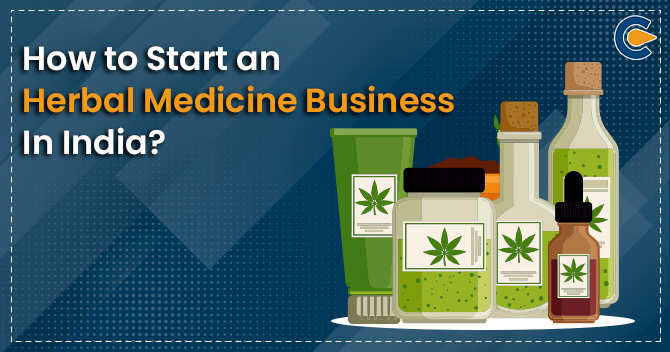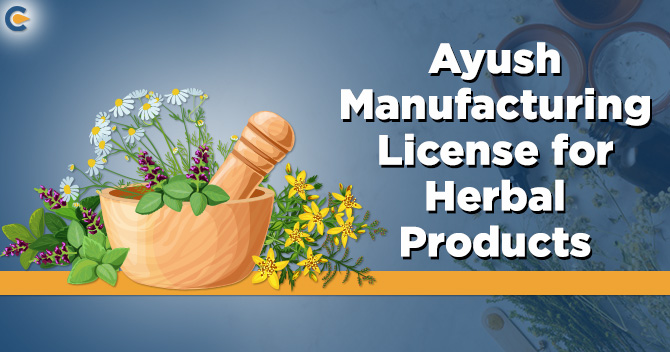Herbal medical business falls under the purview of AYUSH ministry. AYUSH stands for Ayurveda, Yoga and Naturopathy, Unani, Siddha and Homeopathy. Registration under AYUSH is mandatory for those who aspire to engage in the business of herbal medicine in India. Let’s explore the legalities around this business and the licenses provided by the AYUSH ministry in detail.
What is herbal medicine?
Herbal medicine (aka phytomedicine or botanical medicine) originated from a plant’s roots, seeds, flowers, leaves, berries, etc., for medicinal purposes. Herbalism has been in effect since the 19th century. The advancements in analysis, quality control, and clinical research has expedited growth of herbal medical sector in India.
Market Analysis of herbal medicines from India’s perspective
- In 2019, the Indian medical plant market stood at Rs 4.2 billion and is projected to thrive at a CAGR of 38.5% by 2026. The net global herbal trade is presently assessed at US$ 120 billion.
- India’s share in the international export of herbs has witnessed a marginal decline owing to dated and quality control procedures, lack of advanced processing, R&D, standardization in products and legal framework in the trade of medicinal plants. The export of herbs and other key extracts of medicinal herbs is increasing every passing year.
- In 2017-2018, India shipped around US$ 330.18 million of herbs at a healthy growth rate of 14 per cent compared to the preceding year.
- Also, exports of productive extracts of medicinal herbs and herbal items in FY 2017-2018 stood at US$ 456.12 million, registering a growth rate of almost 13 per cent over the last year. India has witnessed an increasing demand in European and other developed countries for herbal/value-added extracts of medicinal herbs.
Licenses need to set up herbal medicine business in India
AYUSH ministry handles the licensing and post-registration compliances for the herbal medicine business in India. The AYUSH license serves as a fundamental permit for such businesses in India. Presently, the competent authority under the AYUSH ministry confers the three types of production licenses
1. Complete Manufacturing License.
2. Loan License.
3. Contract Manufacturing / Third party manufacturing / White label Manufacturing / Product to Product manufacturing.
Complete Manufacturing License
refers to a comprehensive manufacturing license. The license also legalizes the marketing efforts for such products. That means production and marketing will be possible after securing this very license. The requirements and paperwork for this license may vary state-wise. The applicant looking to set up herbal item production unit in India has to meet the following prerequisites:
· Minimum size of the production premises should be not less than 1200 sqft if dealing with one category of drug. More space would be required in case of the inclusion of additional categories.
- The production premises should have GMP certification in place.
- The availability of 2 Ayurvedic experts and 2 Pharmacist is mandatory
- The availability of required machinery set up is compulsory
Loan License
A loan License refers to a production permit where you liaise with a GMP certified production facility to manufacture your products. It is ideal for an entity that lacks adequate resources to set up a full-fledged production facility. After availing of this license, you can commence a production undertaking with your certified facility.
The alteration of the certified partner is also possible in this regard. But for this purpose, you need to follow the entire licensing procedure again. The license allows the licensee to sell the product under their name without disclosing the detail of the certified facility. The loan license seeks applicant to meet the following requirements before coming into effect;
- The proposed premises should have one room for handling official affairs, one room for storing raw material, and one room for storing finished goods.
- The proposed liasoing facility should belong to the state where the applicant’s business is registered
- Other paperwork.
Contract / Third-Party Manufacturing License
This license permits businesses to utilize the production license of another GMP-certified manufacturer to produce the herbal medicines. In such a case, you only need to indulge in marketing activities. The license helps you allocate resources in areas other than manufacturing, thereby ensuring higher ROI.
To get started with such kind of business model, the third-party manufacturer is the one who has to deal with the licensing requirement upfront. Also, the obligation for product approval is in the hand of the third-party manufacturer.
The profit margin for the licensee will be entirely dependent on the fact which party deals with the raw material procurement.
Note: Under this license, either party is liable to disclose their exact status/role on the product labeling.
The licensee, in this case, has to bear the following expenses:
- Cost of manufacturing herbal medicines
- Product approval fees
Notable facts
- Licensee in this case has to draw an arrangement with the liaison facility that confirms its ownership status over products in question.
- Unlike loan license, where there is a mandate that either party should belong to same state, this license nullifies such a requirement.
Role of GMP Certification for Herbal Medicine Production Business
In order to get increased recognition in the international herbal markets, one has to align their facility with the guidelines of the GMP standards and accordingly obtain the GMP license. Apart from ensuring quality production, GMP also aids drug production facilities to instil a credible image in other markets and therefore reap increased sales.
What is GMP?
GMP is an abbreviation for Good Manufacturing Practice, & the term is used worldwide for administering the control and quality of pharmaceutical items, including herbal medicines.
It underpins various directions around the quality assurance approach. GMP Certification takes various parameters into account that may influence the quality of the final product in one way or another. GMP certification is all about the continual improvement of the quality management system[1] of the production facility.
GMP certification seeks to standardize the following to ensure better quality management and production.
- Record Keeping
- Paperwork
- Sanitation
- Equipment verification
- Workplace hygiene
- Grievance control
- Human resource
- Process hygiene
- Quality control
The fundamental object of GMP certification is to curtail the threshold of risk relating to the production of medicinal items.
Conclusion
There is an array of compliances that one has to meet for setting up a herbal medicine business in India. If compliance handling is not your concern, then you can opt for Complete Manufacturing License, where there would be no profit-sharing. Similarly, if your budget is low, then you can apply for the rest of the licenses, which mitigates the need for establishing a production facility.
Read our Article:AYUSH Loan License: Meaning, Documents, and Benefits











